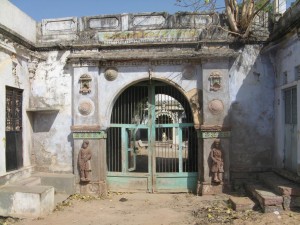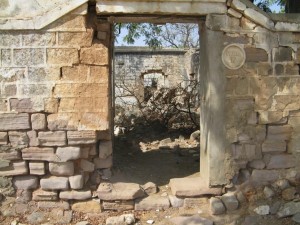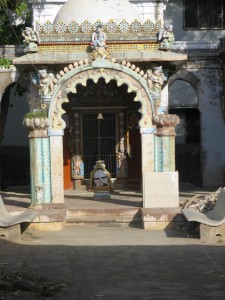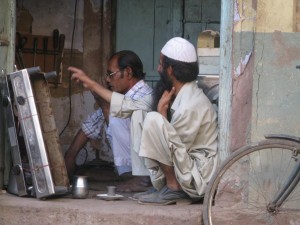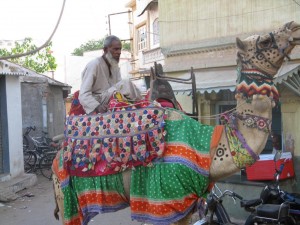Went to the police station today to get a visitor’s permit for ‘the restricted areas of the Kachchh district’. The application process is straight forward and I got the permit. One just has to list the places one wants to visit as well as those where one wants to stay over night. I just listed pretty much all the bigger places in the area (ie. those shown on the map) and hope the smaller ones are automatically included. I also asked the police officer about crossing the Rann from Khavda to Dholavira. The answer was a disappointing ‘no way’. Apparently, everything up there is military area. Great. Well, I’m not going to discuss my thoughts about military (or terrorists) here. I just wish they’d all p*ss off.
Well, not all was bad today. I met three Israelis and a Argentinean/Spanish couple at the police station, all of which also applied for a visitor’s permit. Afterwards, I joined the couple in their search for the Folk Museum. Took us about 20 or 30 minutes because all the maps of Bhuj they had were simply wrong. The entry fee to the museum is 2 Rs for visitors, and 50 Rs for foreign visitors. We skipped the museum (because it was about to close for the day) and kept wandering about. Stopped for a tea when an older dude on a beautifully decorated and painted camel came by. He posed for our cameras and then offered me a ride around the block. Cool!
I picked up my new luggage bags from the tailor and did some shopping. Back in the hotel, I chatted some more with Aarif, the guy from the artisan shop. He showed me some of the products he’s selling and explained the process of creating them. For example, he’s got some drapery and saris that are specially dyed. Many hundred or even thousand little knots are made into the textile, which, when dyed, stay white (or whatever the original color was). These dots then form a pattern or image. The knots are made by women in the villages of the Kachchh (those that specialize in this kind of work; different communities specialize in different crafts: embroidery, dying, woodcarving, etc) after their daily work in the house, to add to the household income. Depending on the size of the knots, they get paid between 50 Rs (bigger knots) and 300 Rs (smaller knots) per 4000 knots. Depending on the size of the cloth and the pattern, knotting may take from 20 days up to a year.

